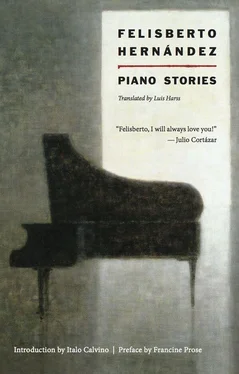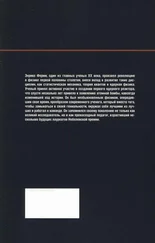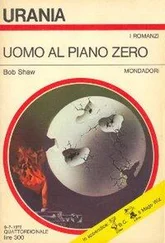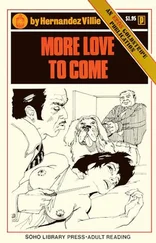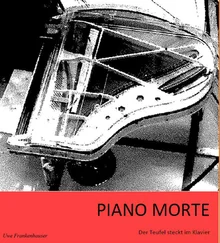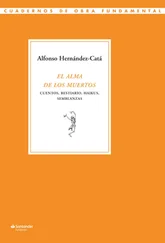Felisberto Hernandez - Piano Stories
Здесь есть возможность читать онлайн «Felisberto Hernandez - Piano Stories» весь текст электронной книги совершенно бесплатно (целиком полную версию без сокращений). В некоторых случаях можно слушать аудио, скачать через торрент в формате fb2 и присутствует краткое содержание. Год выпуска: 2014, Издательство: New Directions, Жанр: Современная проза, на английском языке. Описание произведения, (предисловие) а так же отзывы посетителей доступны на портале библиотеки ЛибКат.
- Название:Piano Stories
- Автор:
- Издательство:New Directions
- Жанр:
- Год:2014
- ISBN:нет данных
- Рейтинг книги:4 / 5. Голосов: 1
-
Избранное:Добавить в избранное
- Отзывы:
-
Ваша оценка:
- 80
- 1
- 2
- 3
- 4
- 5
Piano Stories: краткое содержание, описание и аннотация
Предлагаем к чтению аннотацию, описание, краткое содержание или предисловие (зависит от того, что написал сам автор книги «Piano Stories»). Если вы не нашли необходимую информацию о книге — напишите в комментариях, мы постараемся отыскать её.
Piano Stories
Piano Stories — читать онлайн бесплатно полную книгу (весь текст) целиком
Ниже представлен текст книги, разбитый по страницам. Система сохранения места последней прочитанной страницы, позволяет с удобством читать онлайн бесплатно книгу «Piano Stories», без необходимости каждый раз заново искать на чём Вы остановились. Поставьте закладку, и сможете в любой момент перейти на страницу, на которой закончили чтение.
Интервал:
Закладка:
V
The next days, Mary took Horace for long walks. She wanted to get his mind off Daisy. Yet she was convinced it was not Daisy he missed but the real daughter she could never have.
The afternoon Daisy was returned, Horace did not show any particular affection for her, and again Mary feared she was not the reason for his sadness. But, just before dinner, she noticed him lingering over Daisy with restrained emotion, and felt relieved.
After that, for several nights, as he kissed his wife before going in to see his dolls, he watched her face intently, with searching eyes, as if to make sure there was nothing strange hidden anywhere. He had not yet been alone with Daisy.
Then came a memorable afternoon when, in spite of the mild weather, Mary replenished Daisy’s hot water, packed Horace comfortably into bed with her for his nap, and went out.
That evening he kept scanning every inch of her face, watching for the enemy she would soon become. She noticed his fidgety gestures, his stilted walk. He was waiting for the sign that he had been found out.
Finally, one morning, it happened.
Once, some time ago, when Mary had been complaining of Alex’s beard, Horace had said: “At least he’s not like one of those twin maids of yours that you can’t tell apart.”
She had answered: “Why, do you have anything special to say to either of them? Has there been some mix-up that has. . inconvenienced you?”
“Yes, I was calling you once — and who do you think turned up? The one who has the honor to bear your name.”
After which the twins had been ordered to stay out of sight when he was home. But, seeing one vanish through a door once at his approach, he had plunged after her, thinking she was an intruder, and run into his wife. Since then Mary had them come in only a few hours in the morning and never took her eyes off them.
The day he was found out, Mary had caught the twins raising Daisy’s nightie when it was not time to dress her or change her water. As soon as they had left the bedroom, she went in. In a little while the twins saw the lady of the house rush across the courtyard into the kitchen. On her way back she was carrying a carving knife. They were terrified and tried to follow her, but she slammed the door on them. When they peeped through the keyhole her back blocked their view, so they moved to another door. She had Daisy flat on a table, as if to operate on her, and was in a frenzy, stabbing her all over. She looked completely disheveled: a jet of water had caught her in the face. Two thin spurts rose in an arc from one of Daisy’s shoulders, mixing in the air, like the water from the fountain in the garden, and her belly gushed through a rip in her nightgown. One of the twins had knelt on a cushion, with a hand over one eye, the other eye stuck, unblinking, to the keyhole. When the draft that blew through the hole made her eye run, her sister took her place. Mary also had tears in her eyes when she finally dropped the knife on Daisy and slumped into an armchair, sobbing, with her face buried in her hands. The twins lost interest in the scene and returned to the kitchen. But soon the lady called them back up to help her pack. She had decided to handle the situation with the wounded dignity of a fallen queen. Determined to punish Horace and, meantime, to adopt the appropriate attitude in case he showed up, she instructed the twins to say she could not receive him. She began making arrangements for a long trip and gave the twins some of her dresses. They followed her out into the garden, and when she drove off in the family car they finally realized what was happening and started to howl over the lady’s misfortune. But, back in the house with their new dresses, they were gleeful. They drew open the curtains that covered the mirrors — to spare Horace the unpleasantness of seeing himself in them — and held the dresses up to their bodies for effect. One of them saw Daisy’s mangled shape in a mirror and said: “What a beast!” She meant Horace, who had just appeared in a door and was wondering how to ask them to explain the dresses and the bare mirrors. But, suddenly catching sight of Daisy sprawled on the table in her torn nightie, he directed his steps toward her. The twins were trying to sneak out of the room, but he stopped them:
“Where’s my wife?”
The one who had said “What a beast!” stared him full in the face and answered:
“She left on a long trip. And she gave us these dresses.”
He dismissed them and the thought came to him: “The worst is over.” He glanced at Daisy again: the carving knife still lay across her belly. He was not too unhappy and for a moment even imagined having her repaired. But he pictured her all stitched up and remembered a rag horse he had owned as a child, with a hole ripped in it. His mother had wanted to patch it up, but it had lost its appeal and he had preferred to throw it away.
As for Mary, he was convinced she would come back. He kept telling himself: “I have to take things calmly.” He welcomed the return of the bold and callous self he had been in his prime. Looking back over the morning’s events, he could easily see himself betraying Daisy as well. A few days ago Frank had shown him another doll: a gorgeous blonde with a shady past. Frank had been spreading word of a manufacturer in a northern country who made these new dolls. He had imported the designs and — after some experimenting — found them workable. Soon a little shy man had come by, with big pouchy eyes gleaming under heavy lids, to inquire about the dolls. Frank had brought out pictures of the available models, saying: “Their generic name is Daisy, but then each owner gives them whatever pet name he wants. These are the models we have designs for.” After seeing only three of them the little shy man had picked one almost at random and put in an order for her, cash in hand. Frank had quoted a stiff sum, and the buyer had batted his heavy lids once or twice, but then he had signed the order, with a pen shaped like a submarine. Horace had seen the finished blonde and asked Frank to hold her for him, and Frank, who had others on the way, had agreed. At first Horace had considered setting her up in an apartment, but now he had a better idea: he would bring her home and leave her in the glass case where he kept the dolls waiting to be assigned their roles. As soon as everyone was asleep he would carry her up to the bedroom, and before anyone was up in the morning he would put her back in the glass case. He was counting on Mary not returning in the middle of the night. From the moment Frank had set the doll apart for him, he had felt himself riding a lucky streak he had not known since adolescence. Just happening to have been out until it was all over with Daisy meant a higher power was on his side. With this assurance, in addition to his new youthful vigor, he felt in command of events. Having decided to exchange one doll for another, he could not stop to shed tears over Daisy’s mutilated body. Mary was certain to be back, now that he no longer cared about her, and she could dispose of the corpse.
Suddenly Horace started to edge along the wall like a thief. Sidling up to a wardrobe, he drew the curtain across the mirror. He repeated the gesture at the other wardrobe. He had had the curtains hung years ago. Mary was always careful to shield him from the mirrors: she dressed behind closed doors and made sure the curtains were in place before leaving the room. Now he was annoyed to think the twins had not only been wearing Mary’s clothes but had left the mirrors uncovered. It was not that he disliked seeing things in mirrors, but his sallow face reminded him of some wax dolls he had seen in a museum one afternoon. A shopkeeper had been murdered that day, as had many of the people whose bodies the dolls represented, and the bloodstains on the wax were as unpleasant to him as if, after being stabbed to death, he had been able to see the wounds that had killed him. The only mirror in the bedroom without a curtain was the one over the dresser: a low mirror before which he bent just far enough for a quick glimpse at the knot of his tie as he went by absently each day. Because he combed and shaved by touch, from the mirror’s point of view he had always been a man with no head. So now, after covering the other mirrors, he went by it as blithely as usual. But when it reflected his hand against his dark suit he had the same queasy sensation as when he caught sight of his face. He realized then that his hands were also the color of wax. At the same time, he remembered some loose arms he had seen in Frank’s office that morning. They were pleasantly colored and as shapely as those of the blonde doll, and, like a child asking a carpenter for scraps, he had told Frank:
Читать дальшеИнтервал:
Закладка:
Похожие книги на «Piano Stories»
Представляем Вашему вниманию похожие книги на «Piano Stories» списком для выбора. Мы отобрали схожую по названию и смыслу литературу в надежде предоставить читателям больше вариантов отыскать новые, интересные, ещё непрочитанные произведения.
Обсуждение, отзывы о книге «Piano Stories» и просто собственные мнения читателей. Оставьте ваши комментарии, напишите, что Вы думаете о произведении, его смысле или главных героях. Укажите что конкретно понравилось, а что нет, и почему Вы так считаете.
